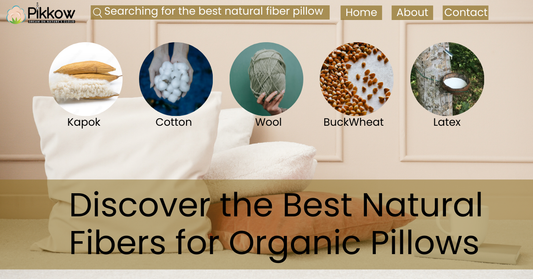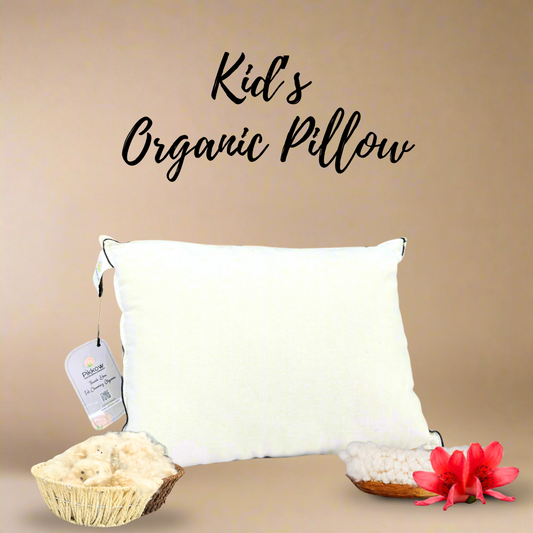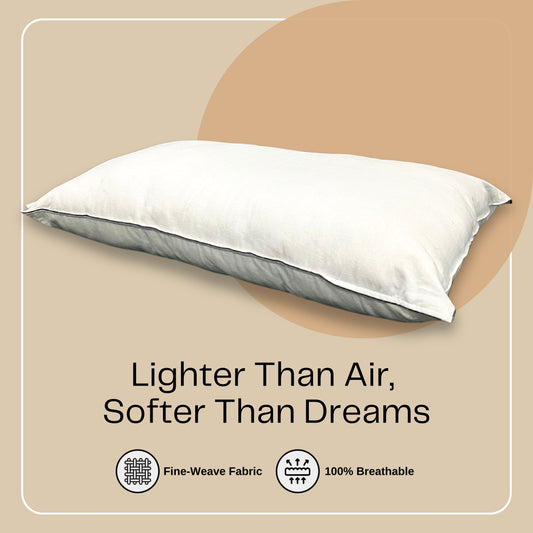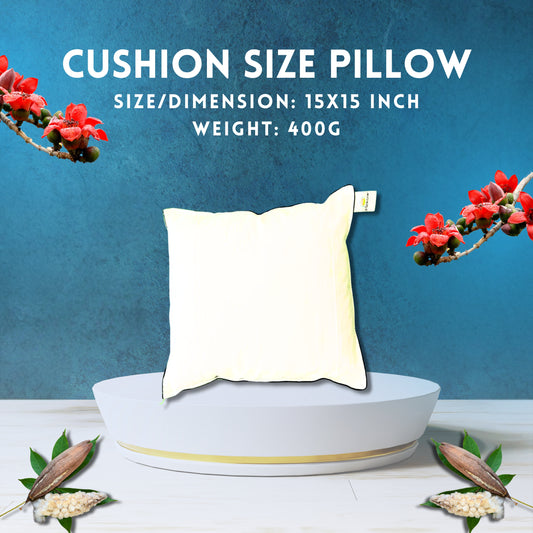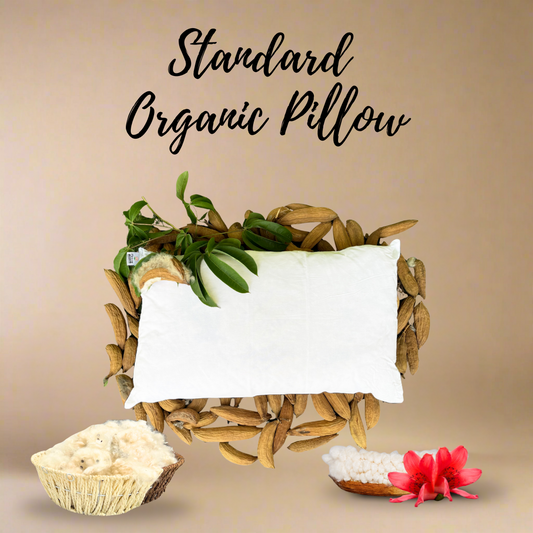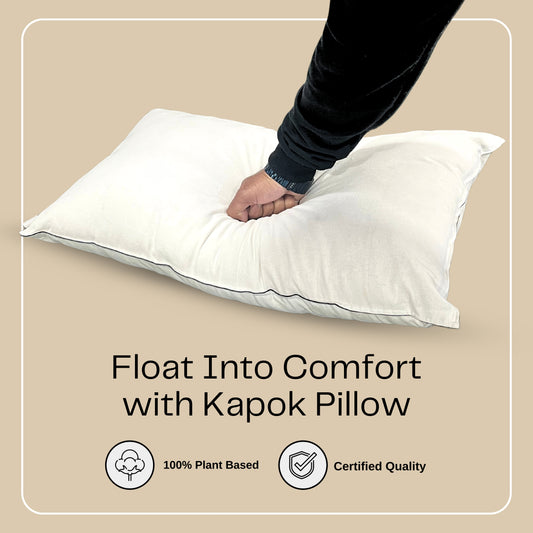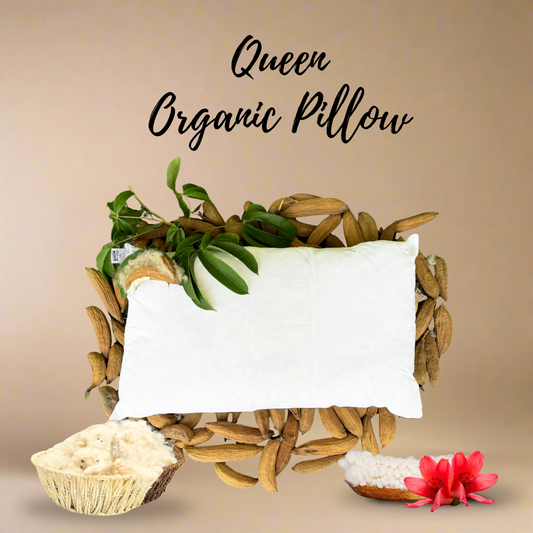Have you ever wondered what goes into creating the perfect pillow—one that’s soft, supportive, and safe for your family? Behind every PIKKOW organic kapok pillow lies a fascinating journey of nature, craftsmanship, and sustainability. From the lush green canopy of the Kapok tree to the final, handcrafted pillow that graces your bed, this is a story of purity, care, and mindful comfort.
In this blog, we’ll take you inside the beautiful process of how kapok pillows are made, explore why this ancient natural fiber remains unmatched, and show you why PIKKOW’s pillows stand for a sleep experience that’s eco-friendly and deeply rejuvenating.
The Origin: The Kapok Tree – Nature’s Softest Gift
The journey begins in tropical forests, where the Ceiba pentandra, or Kapok tree, grows tall and free. This majestic tree produces large seed pods filled with silky, cotton-like fibers—known as Kapok fiber. These light, fluffy strands are the heart of every PIKKOW organic pillow, known for their softness, hypoallergenic nature, and breathability.
What makes Kapok special is that it’s 100% natural and renewable. The tree regenerates on its own without fertilizers or pesticides, making it a perfect fit for those who value sustainable living. Unlike synthetic materials that rely on petroleum-based processes, Kapok comes directly from nature, needing no chemical refinement.
So, when you rest your head on a PIKKOW pillow, you’re not just sleeping—you’re connecting with a natural legacy that’s kind to both you and the planet.
Harvesting with Care: A Sustainable Start
The first step in how kapok pillows are made is harvesting the seed pods. This is a delicate process—farmers handpick mature pods to ensure the trees continue to thrive. No cutting, burning, or harmful extraction is involved. The focus is on preserving the ecosystem and respecting the natural rhythm of the forest.
Each pod is opened to reveal the silky fibers wrapped around tiny seeds. The fibers are then carefully separated, a process often done by hand or using simple tools to maintain their natural loft and softness. This slow, careful approach is what gives PIKKOW pillows their signature airy feel.
Sustainability Fact: Kapok trees absorb CO₂ and support biodiversity, making them a vital part of forest ecosystems in India and Southeast Asia.
Cleaning and Preparing the Kapok Fiber
After harvesting, the fibers undergo a gentle cleaning process to remove dust and impurities. Unlike synthetic fillers that require chemical treatments, Kapok fibers are cleaned using natural, eco-friendly methods such as air filtration and sun drying.
At PIKKOW, the fibers are then fluffed to enhance volume and softness—ensuring every pillow offers a cloud-like comfort. The handcrafted bedding process ensures each step is done with precision and respect for the fiber’s natural qualities.
Did you know? Kapok fibers are naturally resistant to mold, mites, and bacteria, making them ideal for allergy sufferers. This means your PIKKOW pillow stays fresh, healthy, and safe for the whole family.
Craftsmanship: The Handcrafted Touch
Once the fibers are cleaned and fluffed, they are filled into organic cotton covers. This step defines the art of organic pillow production—where traditional craftsmanship meets modern sustainability.
Each PIKKOW pillow is hand-stitched, ensuring a perfect balance between comfort and durability. Skilled artisans carefully weigh and adjust the filling to achieve optimal loft—neither too soft nor too firm. This handcrafted approach allows every pillow to support your neck alignment while maintaining plush comfort.
Here’s where PIKKOW’s difference truly shines. Instead of mass-producing with machines, they preserve an artisanal touch—offering products that feel personal, authentic, and naturally luxurious.
Testing Comfort and Quality
Every PIKKOW pillow goes through a quality check to ensure it meets the brand’s high standards for comfort, breathability, and durability. The process includes:
|
Test |
Purpose |
PIKKOW Standard |
|
Breathability Test |
Ensures airflow for cool sleep |
Natural fiber structure |
|
Softness Test |
Maintains cloud-like texture |
Hand-fluffed filling |
|
Hygiene Test |
Ensures hypoallergenic quality |
100% chemical-free |
|
Longevity Test |
Tests resilience and bounce |
3x longer lifespan than synthetics |
The result? A pillow that feels luxurious, stays fresh longer, and provides sustainable sleep comfort throughout the year—especially during India’s dry winters.
The Benefits: Why Kapok Always Wins Over Synthetic
It’s no secret that synthetic fibers like polyester dominate the bedding market. But when you compare semal cotton vs synthetic materials, nature always wins.
Here’s why PIKKOW’s kapok pillows stand out:
-
Hypoallergenic & Chemical-Free: No toxins, no synthetic residues—just clean, breathable comfort.
-
Temperature Regulating: Kapok naturally adjusts to body temperature, preventing night sweats.
-
Eco-Friendly: Biodegradable and sourced from renewable trees.
-
Supportive Yet Soft: Unlike foam or polyester, Kapok supports your neck without stiffness.
-
Perfect for All Ages: Safe for children, adults, and seniors alike.
In short, if you’ve been wondering why organic pillows cost more, the answer lies in the purity, sustainability, and craftsmanship behind every piece.
How PIKKOW Upholds Sustainability
Sustainability is not just a buzzword for PIKKOW—it’s a promise. From sourcing Kapok from ethically managed farms to using GOTS-certified organic cotton covers, every decision reflects responsibility and care.
PIKKOW’s commitment includes:
-
Supporting local farmers in India
-
Avoiding synthetic packaging
-
Reducing carbon footprint through minimal processing
-
Promoting long-lasting, biodegradable bedding
This transparency is what makes PIKKOW a trusted choice among eco-conscious Indian families seeking comfort that aligns with their values.
From Nature to Your Bedroom: The Final Touch
The final step in how kapok pillows are made is all about presentation and comfort. Once stitched and tested, each pillow is packaged in eco-friendly, reusable cotton bags—free from plastic.
Before reaching your home, every PIKKOW pillow carries with it a story of sustainability, care, and mindful craftsmanship. When you lay your head down, you’re not just sleeping—you’re embracing a product that reflects harmony between humans and nature.
Conclusion: Rest Easy with PIKKOW
From the moment the Kapok tree blooms to the time your pillow arrives at your doorstep, PIKKOW’s journey is rooted in purity, comfort, and sustainability. Every thread, every fiber, and every stitch embodies nature’s promise of healthy, restorative sleep.
If you’re searching for an organic pillow for dry winter nights, one that supports both your comfort and the planet, PIKKOW’s organic kapok pillow is your answer.
Experience the joy of truly natural sleep—the kind that lets you rest easy, breathe freely, and wake up refreshed.
Also Read:
How Organic Pillows Help Relieve Headache and Improve Sleep Quality
The Future of Sleep: Why “Organic” Will Replace “Orthopedic”
The Ultimate Guide to Choosing the Right Organic Pillow for You
How Switching to Pikkow Can Reduce Plastic Waste in Bedding
Kapok Pillows in India: Why They’re the New Choice for Smart Sleepers
7 Reasons to Switch to Kapok Pillows for Healthier, Deeper Sleep
Pikkow vs Regular Pillows: Why Organic Always Wins
Why the World Should Call Organic Pillows “PIKKOW” — The New Standard of Natural Sleep
Why Organic Kapok Pillows Are Perfect for Dry Winter Nights
FAQs
1. Why organic kapok pillows are best for Indian winters?
Kapok pillows provide warmth without overheating. Their breathable natural fibers make them ideal for India’s cool, dry winter climate.
2. Are kapok pillows good for dry skin and allergies?
Yes. Kapok is hypoallergenic, chemical-free, and moisture-regulating—perfect for people with sensitive skin or dust allergies.
3. How to sleep comfortably during dry winter nights?
Use breathable bedding like organic kapok pillows and cotton covers. Keep indoor humidity balanced and avoid synthetic fabrics.
4. Benefits of using natural pillows in winter season?
Natural pillows like PIKKOW’s Kapok maintain skin hydration, reduce irritation, and offer long-lasting comfort.
5. Organic vs synthetic pillows: which is better for winter?
Organic pillows win—better airflow, zero toxins, and superior comfort. Synthetic ones trap heat and attract allergens.




